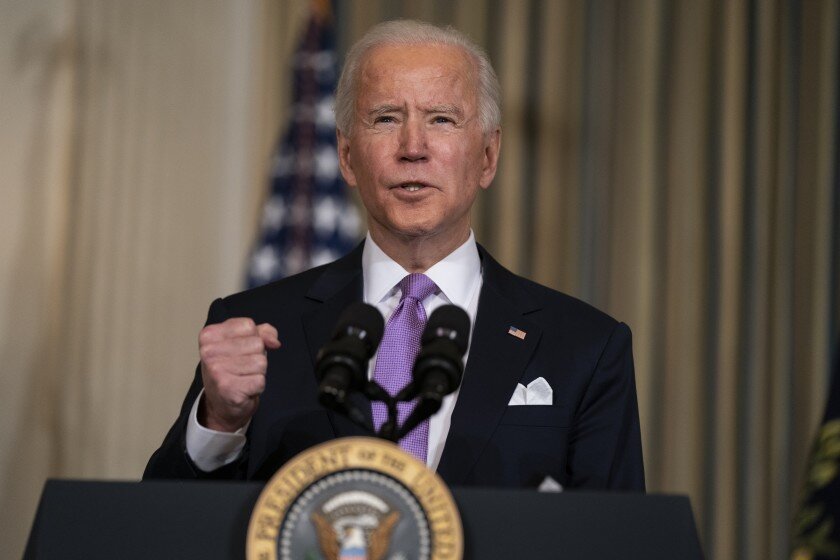Los Angeles Times acknowledges first move to revive JCPOA must be taken by U.S.

TEHRAN - One of Donald J. Trump’s greatest blunders as president was to repudiate the 2015 international agreement in which Iran accepted significant limitations on its nuclear program — restrictions designed to halt some part of its nuclear activities, according to Los Angeles Times.
Rather than persuading Iran to admit tougher restrictions, as the Trump administration hoped, the decision to quit the deal in 2018 and impose economic sanctions gave the Islamic Republic the incentive to not fulfill some of its commitments under the accord, the American newspaper writes.
The publication sought to exaggerate Joe Biden’s promises over the Iran nuclear deal and wrote, “During last year’s campaign, Joe Biden promised that the United States would rejoin the agreement — known as the Joint Comprehensive Plan of Action — if Iran returned to strict compliance.”
Nevertheless, the newspaper acknowledges the revival of the JCPOA will be difficult for several reasons, including the fact that Iranian President Hassan Rouhani, a relative moderate, will not be able to seek reelection in June.
According to Los Angeles Times, Iranian conservatives who are willing to escalate Iran’s nuclear activities have been provoked not only by Trump’s use of economic sanctions to exert “maximum pressure” on Iran but last year assassination of Gen. Qassem Soleimani, who led the Islamic Revolutionary Guard’s Quds Force, by the U.S. military drones.
The newspaper argues Iran’s move to ignore some provisions of the JCPOA also complicates President Biden’s decision-making. Last year Iran announced that it would no longer observe the agreement’s restrictions on uranium enrichment, which banned the country from enriching the purer kinds of uranium. It has since used more powerful advanced centrifuges in the enrichment process, which the agreement also prohibited, and is now producing 20% enriched uranium — far above the 3.67% enrichment has been set in the JCPOA.
Iran has asserted at times that it is the responsibility of Biden to make the first move. Mohammad Javad Zarif, the Iranian foreign minister, told CNN, “It was the United States that left the deal. It was the United States that violated the deal. It was the United States that punished any country that remained respectful and compliant with the deal. So it is for the United States to return to the deal, to implement its obligations.”
However, the Biden administration has stressed that Iran must act first. In an interview with CBS broadcast, the president was asked: “Will the U.S. lift sanctions first in order to get Iran back to the negotiating table?” He answered, “No.”
Antony J. Blinken, new U.S. secretary of state, has made similar statements. He told CNN, “If Iran returns to compliance with its obligations under the nuclear agreement, we would do the same thing and then we would work with our allies and partners to try to build a longer and stronger agreement and also bring in some of these other issues like Iran’s missile programs.”
Moreover, Jake Sullivan, the U.S. national security advisor, has signaled a greater urgency, saying that “a critical early priority has to be to deal with what is an escalating nuclear crisis as [the Iranians] move closer and closer to having enough fissile material for a weapon.”
“Biden is right to insist that Iran return to full compliance, but it would be a mistake for him simply to wait for that to occur before demonstrating to Iran — and to America’s European allies who helped negotiate the JCPOA, along with China and Russia — that he is serious about salvaging the agreement,” Los Angeles Times wrote.
The newspaper recommended Biden’s administration to “authorize Robert Malley, Middle East (West Asia) expert, U.S. special envoy for Iran, to open a channel of communication with Iran. The U.S. should also seriously consider a suggestion by Zarif that the U.S. and Iran take synchronized steps leading to Iran’s return to full compliance and the reversal of Trump’s rejection of the JCPOA.”
It says, “The JCPOA wasn’t a perfect agreement. Although some of its provisions are permanent, others will expire between 2025 and 2030,” adding, “During last year’s campaign, Biden said that if he were elected and Iran returned to compliance, the U.S. would rejoin the JCPOA as a starting point for negotiations on strengthening and extending its provisions. The JCPOA can be improved on, but returning to the agreement is the necessary first step.”
Engaging Iran on the nuclear issue will face opposition from those in Congress and especially Israel who have denounced the JCPOA, the newspaper wrote. Iran’s support for regional resistance groups and its missile program have to be addressed by Biden’s administration, Los Angeles Times proposed.
The newspaper reiterated the unfounded allegations against Iran and wrote, “Preventing Iran from developing nuclear weapons remains a paramount priority. A nuclear-armed Iran would destabilize the region, provide the Islamic Republic with dramatically more influence and likely inspire other nations in the region to pursue their own nuclear ambitions. Finally, if Iran possessed nuclear weapons, it might be tempted to use them in a crisis — or the fear that it could do so might lead other countries to launch a preemptive strike.”
Nonetheless, Los Angeles Times highlighted some advantages of the accord, underlining, “The JCPOA was a bulwark against these threats, and the United States under Trump recklessly undermined it. On this issue, as on so many others, Biden must move boldly to undo his predecessor’s mistakes.”
EE/PA
Leave a Comment